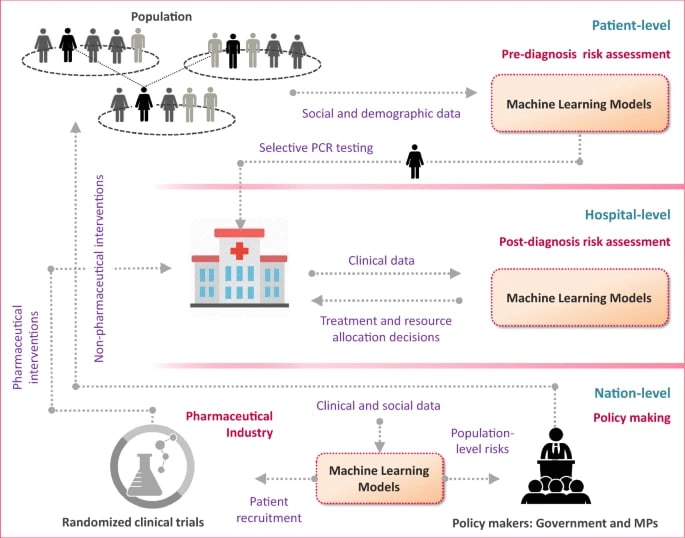It’s been a year since COVID-19 hit the globe and left us confined with the four walls of a room. The pandemic put the entire healthcare system worldwide into crisis and put more strain on it. Earlier, the cases surge significantly across the six continents, causing extreme harm to the patients, but we can see a deterioration in the case with time.
Ever since the outbreak of the pandemic, several studies were conducted to predict its worst outcomes. Studies show that advanced aging, obesity, respiratory diseases, liver, neurological, and kidney diseases are the main players of the worst outcome.
Researchers are moving towards artificial intelligence and machine learning tools to effectively allocate new resources and ease the strain on the already burdened healthcare ecosystem.
With this blog, you will see that how Artificial Intelligence and Machine learning tools will help healthcare professionals predict the COVID-19 outcomes.
Using EHRs of patients
According to a study published in Radiology, an AI tool can predict the COVID-19 outcomes of patients in the emergency room by using the EHRs of the patients aged between 21 years and 50 years old, lab tests, and chest X-rays.
The algorithm is built in such a way that it helps in determining the patients who are at high risk of intubation within 30 days of arriving at the hospital. This will help the clinicians in making informed decisions and provide emergency rooms to those whose health is deteriorating at a faster rate.
Those patients who show non-specific symptoms like cough, fever, and respiratory issues are given the secondary weightage. The model can predict intubation and death within 30 days of getting admitted to the hospital that too with a sensitivity of 80 percent.
With this new algorithm, clinicians and healthcare providers can predict outcomes in the COVID-19 patients when they are in the emergency room. It uses the data from the initial patient encounter when they were in the emergency department.
Researchers at UCI health, Irvine leverages analytics tools to predict patient outcomes from the virus. The team of health science investigators has developed a machine learning model that predicts whether a COVID-19 patient will need a ventilator or ICU care.
The primary goal is to give an earlier alert to the healthcare providers that will help them in identifying the patients who are more vulnerable at the onset. This algorithm uses pre-existing conditions like hypertension, asthma, obesity, hospital test results, and other demographic data to gauge if a patient will need a ventilator or ICU care.
AI model can predict the length of the COVID-19 hospitalization
Israeli scientists showcased how a machine learning model can predict the illness of COVID-19 patients by using individuals characteristics. The model will help the clinicians to utilize the hospital effectively as they can predict the patient’s disease as moderate, severe, or critical.
This machine learning model uses the patient’s age, sex, and daily clinical state to predict in-hospital mortality. To ease the unprecedented burden on the healthcare system due to COVID-19, hospitals need tools that can help them plan resource allocation on the hospital, unit, and national levels.
At UCI, researchers tested the AI-based algorithm on over 40 patients, the result shows that this algorithm can help hospitals and healthcare systems calculate exactly the number of ICU beds.
The calculator can also predict the severity score of the patients at any hospital, after this the clinicians can decide on how to move forward based on the number of beds, number of patients, local practices. The tools have guided patient care based on the feedback from critical care, hospital medicine, emergency and infectious disease physicians.
Implementation of AI-based methods can bring the following changes in the healthcare ecosystem:
In the UK, an AI tool helps government officials and decision-makers as they get the continuous update on the most recent epidemiological data on COVID-19, hospital occupancy rates, aggregate risk assessments.
It is directly linked to the NHS patient registration database that helps the officials to make a strategic and selective decision on which area to locate under lockdown and which hospital needs more resources.
Conclusion
While we can see that the COVID-19 pandemic has still not come to a halt, researchers are prioritizing the creation and use of advanced AI and machine learning tools to improve treatment and diagnosis.
Both AI and ML have the potential to facilitate risk stratification, and treatment monitoring to predict and treat the COVID-19 outcomes. If you also own a hospital and want to have tools based on AI and ML that can predict COVID-19 outcomes, hire AI and ML developers who will develop and implement such tools to better assist the users in their decision-making.




Top comments (0)